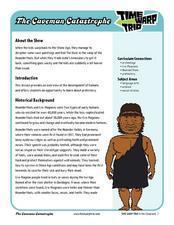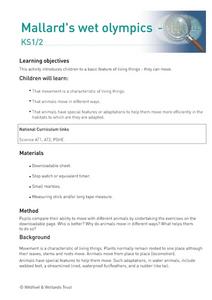Time Warp Trio
The Caveman Catastrophe
Young archaeologists study the development of human history, and work in groups to create a timeline that traces the development of humans. Additionally, the groups utilize a very clever graphic organizer embedded in the plan in order to...
Desert Discoveries
Invent - A - Saurus
Fourth graders get to invent their own dinosaur! This is done by using a very clever worksheet embedded in the plan. The worksheet leads them through naming their dinosaur by having explanations of the Latin terminology that is used with...
Desert Discoveries
Keepers of the Prairie
Young ecologists examine the case of the prairie dog, and their near extinction. They read a terrific student handout embedded in the plan, and engage in a class discussion that's based on what they read. Learners perform research on...
Curated OER
Lesson Plan: Becoming an Animal
The Kwakwaka'wakw are indigenous people from Vancouver Island and British Columbia. The class analyzes a Kwakwak'wakw ceremonial mask, how it was used, and its cultural significance. They then create animal masks representing their...
Denver Art Museum
So Much to See, So Little Time
How do humans and animals impact the environment? What is land division? Youngsters tape off a 12x12 inch square in an outdoor natural space. They sketch everything they see, then compare their drawings as a class. They will then be...
For the Teachers
$1 Math
Captivate your class by having them find the value of their names, different zoo animals, musical instruments, etc.,with a mental math lesson. Using the coding formula listed, children learn to fluently estimate and calculate...
Staten Island Zoo
The African Savanna
Are you thinking about taking your class to the local zoo? Kids of all ages love visiting exotic animals in order to learn about biodiversity, habitat, and animal adaptations. Here is a 44-page activity guide that provides educators with...
Nature Works Everywhere
Recording the Rainforest
Animals have evolved to communicate in different frequencies so they can hear each other throughout the rainforest. The first lesson in a three-part series begins by exploring an interactive story map online about the Borneo rainforest....
Science 4 Inquiry
Frenemies, Bros and Killers: A Lesson in Symbiosis
Animals and plants develop relationships and rely on each other to survive. Pupils learn more about symbiosis through a video, a hands-on matching activity, and a game. They differentiate and describe each type on a written evaluation.
Pace University
Grade 6-8 Living Things
What characterizes a living thing? Scholars explore the concept during a differentiated instruction unit on living things. They perform lab experiments to determine how animals adapt to stimuli, watch videos and learn about...
California Academy of Science
Coral Reef Habitat Match
Different animals live in different habitats, and each animal has specifically adaptive traits that make them tailor-made for their environments. This is true on land and in the ocean. Little ones examine how various marine animals have...
Virginia Department of Education
Weather Patterns and Seasonal Changes
Get your class outside to observe their surroundings with a lesson highlighting weather patterns and seasonal changes. First, learners take a weather walk to survey how the weather affects animals, people, plants, and trees during...
ARKive
Animal over Winter
Gosh those polar regions can get cold. So, how do the animals that live there survive the long winters? Learners explore how animals adapted to survive harsh wintry conditions by completing a worksheet and comparing animal survival...
Curated OER
Mallard's Wetland Olympics
Students observe plants and animals of a wetland and then compare their ability to move with different animals by undertaking the exercises on a downloadable page.
Curated OER
School Forest
Sixth graders explore the concept of biodiversity. In this biodiversity lesson, 6th graders discover a variety of planets and animals that live in forests, and how a rotting log benefits that environment. Students also locate...
Curated OER
Layers of the Rainforest
What a great way to discuss the rainforest! Learners discuss the importance of adaptation in the environment and how it is linked to survival. They use critical thinking and inference skills to place animals and insects in the different...
BBC
Ourselves
Young biologists identify parts of the body, sort humans from other animals, and list the difference they see. Learners are split up into groups of three, and each group must find pictures in magazines of humans and other animals. They...
Bright Hub Education
All about Owls
Art projects are great ways to stimulate all the senses. Learners with visual impairments create art to better grasp the concept of day and night. They'll discuss the ways they know the difference in the time of day, the animals that are...
Down Syndrome Possibilities
Down Syndrome: Lesson Plan
You don't usually find lessons written just for learners with Down syndrome, so this is a true jewel. Kindergartners will explore farm animal sounds and identification as they sing the song, "Down on Grandpa's Farm." They sing the song,...
Curated OER
Dancing Flamingos
Students perform a number of activities that mimic flamingo actions and displays. The class discusses why animals behave in certain ways, and how behavioral adaptations help animals to survive.
Desert Discoveries
Who Depends on the Saguaro?
Young scientists design a picture of a saguaro cactus that shows the cactus and some of the animals and plants that interact with it. There are many of these special relationships between plants and animals of the Sonoran Desert. Your...
Curated OER
Praire Biome Models
Fifth graders, in groups, list the physical characteristics of a biome and think of ways in which animals might have to adapt to live there and make a biome mobile ball that show the different types of habitats that shape the praire biome.
ARKive
Seasons in the Woods
Winter in the cold Northwoods of Wisconsin can be hard on animals that aren't adapted to the climate. Investigate the animals that are out and about even in the coldest winter temperatures as you and your class examine animal...
National Wildlife Federation
What's Your Habitat?
How are third graders like rabbits? They both live in habitats and require food, water, and shelter to survive! An educational science lesson encourages your learners to think about their own habitats and survival needs, before comparing...
Other popular searches
- Farm Animals
- Zoo Animals
- Nocturnal Animals
- Prehistoric Animals
- Arctic Animals
- Jungle Animals
- Plants and Animals
- Desert Animals
- Animals and Their Habitats
- Oviparous Animals
- Classification of Animals
- Winter Animals























